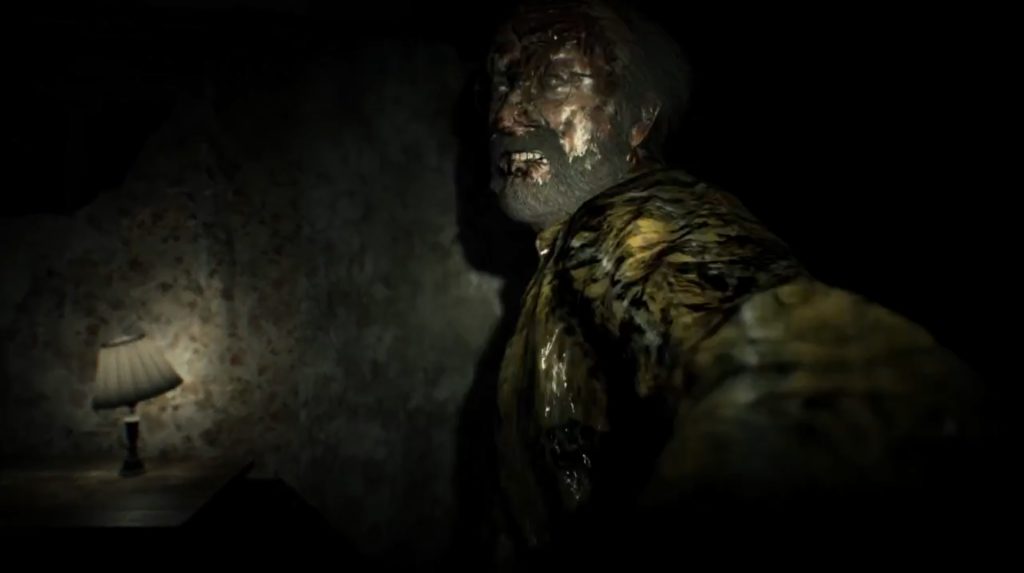After expanding beyond survival horror into globe-trotting action, Capcom has gone back to its roots with Resident Evil 7: Biohazard. The January 24 release for PC, PlayStation 4, PlayStation VR (PSVR) and Xbox One introduces a brand new storyline set in Louisiana. The game also offers a first-person perspective of the scares, which takes the immersion up a level, especially with the PSVR version of the game.
Masachika Kawata, Resident Evil series producer, has been working on this franchise from the very beginning. [a]listdaily caught up with Kawata at Sony’s recent PlayStation Experience event to find out how the franchise has evolved since the original game launched in 1996, and what’s in store for fans in the newest chapter.
What were your goals heading into Resident Evil 7?
Our primary goal was making sure we had a numbered flagship Resident Evil title on next generation hardware and really making sure that we were going back to our survival horror roots and offering the most immersive experience possible.
Can you talk a little bit about going back to the roots of the franchise and what that means for Resident Evil?
If you look at the history of Resident Evil, we’ve evolved the franchise after every three titles. This actually isn’t intentional. It’s kind of lined up with the changing of the game industry and the changing of the times. We felt that the franchise has moved forward in a more action-oriented direction and we figured this would be a perfect opportunity to take RE7 and really go back to our roots—revisit them and rethink what it means.
What did the first-person perspective open up from a horror storytelling standpoint?
The fact that you’re not able to see a character from a distance. You’re actually kind of in the experience yourself. You’re more simulating an experience. That’s something that we were able to take and offer a more intimate story experience.
Louisiana is known as a very haunted place. What inspiration did that setting open up for you creatively?
In terms of the vision that we were going for in with the overall background and the environment, we felt that the setting of Louisiana really meshed well with our vision for our next title.
Did you do any type of research trips down there and stay at any haunted places as inspiration?
I personally was not able to go out to Louisiana, but other staff members went and were able to get a lot of data that we were able to incorporate into the game. Not only were they able to get a lot of different shots of the scenery, they were able to experience a lot of the wilderness as well.
Where do you draw inspiration from when it comes to horror and what scares you?
In terms of general inspirations for entertainment as a whole, we draw a lot of inspiration from movies. As a great example, we definitely drew a lot of inspiration from Evil Dead, and a lot of classic horror titles that we grew up with for the development team as a whole. For me personally, when developing this game, I tapped into just the fear of death. That’s a fear that anyone can relate to and Resident Evil offers you the opportunity to figure out a way to escape death, fight back against your adversary and try to survive one more second. So that was definitely something that we took into account with developing this title—to make sure that that element of fear is definitely there, and a lot of the players still find a means to escape.
How do you go about creating new creatures and adversaries?
In terms of the process of coming up with a new adversary, the first thing that we always want to think of is what kind of experience do we want to offer the user. From there, we ask the question, “How do we offer that experience to the user?” And the easiest way of offering that experience is through some kind of tangible adversary. Then we think about what unique aspects does he have? How do they offer these terrifying experiences? That’s the very general means of how we come up with the enemies in our games.
Does the element of cannibalism, which is part of this new game, scare you?
The conversation of cannibalism is definitely taboo for a human society, so I’m definitely scared of the idea and I think most people are as well. But it’s something that adds to the level of these characters—you’re not really quite sure what they’re going to do. It’s another level of unpredictability that they have. . . the fact that they are unstable and that they’re a little bit distant from regular social norms. That really adds to that little extra attention to the horror that these characters offer. One thing I want to make clear is that cannibalism isn’t necessarily the main theme of this title.
What impact did having a Western writer involved in working with you have on the story, especially with the setting being in Louisiana?
The base script was still written by the Japanese development team. The benefit of having a Western writer come in was the fact that we were able to make sure that it fit within Western norms a little bit better, to make sure that dialogue flowed a little bit better. It’s a little more natural. It’s things that people would actually say, so it adds to that realism that we were really trying to strive for.

